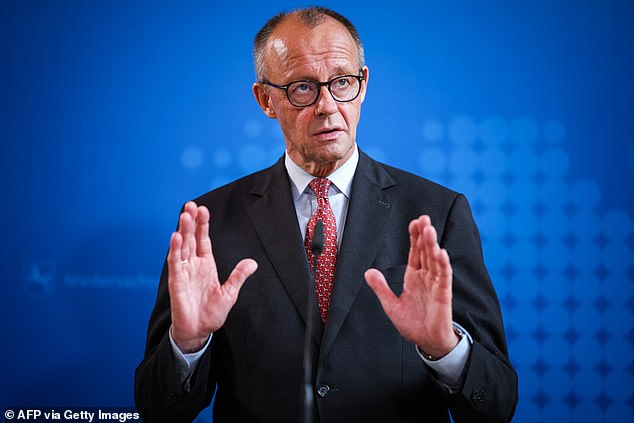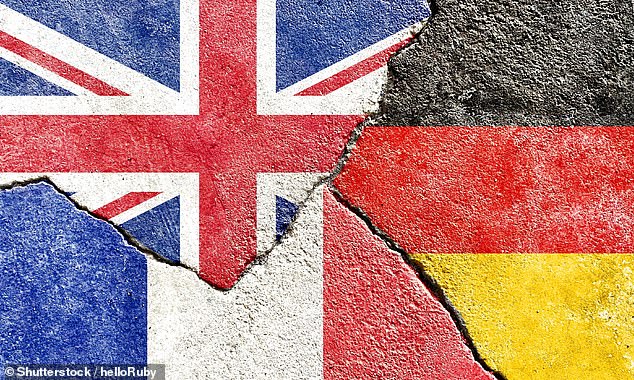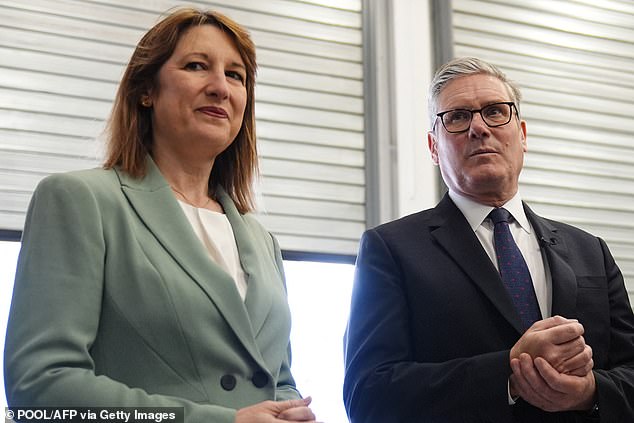It has fallen to Germany‘s new leader, Friedrich Merz, to say what every other European leader, including our own Keir Starmer, knows to be true but hasn’t the guts to say.
‘The welfare state that we have today,’ the German Chancellor told his Christian Democratic Union party conference last weekend, ‘can no longer be financed with what we produce in the economy.’
Merz was making the inescapable point that, with low or no economic growth, his country simply wasn’t generating sufficient wealth to afford its extensive and expensive welfare system.
What is true for Germany is even more true for Britain and France, whose recent economic growth is only a little better than Germany’s and whose fiscal predicament is substantially worse.
Both are tottering on the brink of financial crisis, made all the harder to confront by ballooning welfare spending, which both London and Paris have proved incapable of cutting.
Compared with Britain and France, Germany remains a model of fiscal rectitude, its debt and deficit far lower than those of Europe’s two other biggest economies.
But Merz has loosened Germany’s notoriously tight debt rules to fund a massive rise in defence spending and he has no more idea how to pay for it than our own Prime Minister or President Macron. So Germany’s fiscal position is set to deteriorate too.

‘The welfare state that we have today can no longer be financed with what we produce in the economy’ the German Chancellor Friedrich Merz, pictured, told his Christian Democratic Union party conference last weekend,

Compared with Britain and France, Germany remains a model of fiscal rectitude, its debt and deficit far lower than those of Europe’s two other biggest economies (File Image)
All three countries have become vast entitlement states, so large and so prone to further inexorable growth in welfare spending that they’ve outstripped the ability of slow-growing economies to pay for them.
Hence the mad scramble in all three to raise taxes even higher in economies that are already taxed so much that their ability to grow at anything more than a snail’s pace has been crippled.
It has all the makings of a doom loop: more tax to finance more welfare spending, which taken together undermine further economic growth, necessitating even more taxes to feed the welfare state’s insatiable appetite.
Breaking out of this grim cycle of economic self-harm is the most fundamental challenge facing the democracies of Western Europe, nowhere more so than in Britain and France, both dominated by political elites with a congenital inability to cut welfare spending.
‘Britain and France aren’t illiquid, they’re insolvent,’ wrote The Wall Street Journal, the bible of the bond markets (where governments go to borrow), this week.
‘Their future spending commitments, primarily in the form of expected social-welfare and old-age benefit payouts, far exceed any realistic estimate of the economic growth that will be available to pay those bills.’
After years of profligate spending – occasioned first by the pandemic (those expensive furloughs), then the war in Ukraine (expensive fuel bill subsidies) – instead of engaging in much-needed belt-tightening, Britain is still running deficits of almost 5 per cent of GDP, which means the national debt is now hovering around 100 per cent of GDP.
Growth is generally projected to be a mere 1 per cent this year and not expected to get to 2 per cent in any year between now and the end of the decade. So, contrary to everything Starmer told us in order to get elected, we are not going to grow our way out of our fiscal troubles.

French President Emmanuel Macron can appoint another PM (his seventh). But they will face the same daunting parliamentary arithmetic, says Andrew Neil
But the growth in total welfare spending is unstoppable, no matter who is in power: it has risen by a fifth in the last five years and is set to grow by another fifth in the next five.
A budget that was £210 billion a decade ago is projected to reach £380billion or more by 2030. So we’re looking at nearly a doubling of the welfare bill (even after inflation) in 15 years in an economy struggling to grow by 1 per cent.
Over 6.5 million adults of working age are now on out-of-work welfare payments, of which the 1.7 million claiming some sort of unemployment benefit are only a small part.
More generous sickness and disability benefits are now the benefits of choice for those not working. Even 11 per cent of those in work are claiming some sort of sickness or disability benefit.
The total cost of sickness benefits alone is officially calculated to pass £100 billion in the next financial year (2026-27). Even at today’s prices it was only £20 billion three decades ago. The overall total claiming benefits is bad enough, but when you drill down into specific areas, the picture turns truly horrific.
In places like Blackpool and Birmingham at least a quarter of working-age adults are on out-of-work benefits. Look even closer and you’ll discover that in places such as Easterhouse and Drumchapel, Glasgow’s two massive council estates (or schemes as they’re called in Scotland), the figure is a jaw-dropping 50 per cent.
Signing off young people as ‘long-term sick’, often done down the phone with only the most cursory of checks, is becoming commonplace. Almost a quarter of a million under-25s are now on out-of-work sickness benefits, up 50 per cent in five years. The early evidence suggests most are unlikely ever to work again.
To compensate for the creation of this vast, indigenous army of the unworked, successive governments have imported millions of migrants to fill the jobs those already here won’t do, the social consequences of which we now witness on an almost daily basis.
Mass migration and increasing indolence are two sides of the same coin. Together they amount to the Great Betrayal of our age, an act carried out in plain sight by the nation’s political elite.
We have turned welfare, originally meant to be a safety net only for those who had fallen on hard times, into an income for life for millions – often a workless life at that.

All three countries have become vast entitlement states, so large and prone to further inexorable growth in welfare spending that they’ve outstripped the ability of slow-growing economies to pay for them, says Andrew Neil (File Image)
We don’t even have to take great care of ourselves since the NHS, which now spends more than the GDP of Portugal every year, is there to meet all our health needs, regardless of cost. No wonder we’ve sucked striving out of society. Why bother?
The problem, of course, is that it is unsustainable. The national debt has more than quintupled since 2008. We spend more on servicing that debt than any other G7 country – and more than we spend on defence or education. Of the £150 billion more we will borrow this financial year, £110 billion will go on paying interest on existing debt.
‘We are sliding towards a fiscal crisis of historic proportions,’ says Simon Clarke, former Tory chief secretary to the Treasury. He’s right. The bond markets have clocked that, given Labour’s massive majority in the Commons, we have a Parliament without the will or the inclination to cut spending, especially welfare spending, as Starmer and Chancellor Rachel Reeves found out to their cost earlier this year.
The welfare cuts they proposed were piddling but they couldn’t even get them past a Labour parliamentary party in hock to welfare claimants and the numerous interests surrounding them.
It’s not that the bond markets will stop lending (though some investors will) so much as lenders will simply demand a bigger and bigger risk premium for their loans, making the public finances even more precarious than they already are.
In some ways, the French predicament is even worse. Prime Minister Francois Bayrou has spoken of the ‘chronic disease of debt’, which has risen on average €12 million (£10.4 million) every hour for the past 20 years.
France’s national debt is projected to reach 118 per cent of GDP within the next two years and, at 5.8 per cent of GDP, its annual budget deficit is even bigger than Britain’s. Taxes and public spending are far higher than in the UK and the country is in political as well as financial crisis.
Bayrou has proposed modest savings which would shave £38 billion – or 2.4 per cent – off the planned increase in public spending. But he leads a weak minority government and, with the forces of both Left and Right ranged against him, is likely to go down to defeat in the National Assembly on September 8. Thus is France destined to lose its third prime minister in just over a year.

The bond markets have clocked that we have a Parliament without the will or the inclination to cut spending, especially welfare spending, as Starmer and Chancellor Rachel Reeves, both pictured, found out to their cost earlier this year, says Andrew Neil
French shares slid this week and, as in the UK, the interest on French debt surged. Yet the default response of French politicians across the spectrum is to raise taxes rather than cut spending, least of all welfare entitlements.
This despite the fact that the French welfare state in all its forms now accounts for 51 per cent of the country’s GDP, making it all the harder to increase defence spending in these dangerous times.
The political logjam in Paris adds to France’s fiscal woes. There is no majority in the National Assembly for spending cuts, no consensus on what taxes to raise, no desire to balance the budget, no inkling of a plan for growth from any part of the political divide (French growth will be barely 0.5 per cent this year and lucky to hit 1 per cent next year).
At least Bayrou can say he tried and simply lacked the votes to have his way. Starmer, sitting on a massive Labour majority, doesn’t even have that excuse.
On both sides of the Channel, the fiscal conundrum is made all the worse because the Populist Right is part of the problem. In some policy areas its insurgency has brought refreshing challenges to complacent mainstream parties.
But when it comes to tax-and-spend, Nigel Farage’s Reform party and Marine Le Pen’s National Rally are devotees of Big Government.
Le Pen has led the charge against Bayrou’s modest spending cuts, while Farage has even proposed extending the welfare state by removing the two-child cap on child benefits, at a cost of several billion.
Neither has anything credible to say about welfare reform, never mind cuts to welfare spending. The same is true of the AfD in Germany and Giorgia Meloni’s government in Rome.
The chances of fiscal consolidation in London or Paris – indeed in any major European capital – are close to zero. Which means Western Europe will continue to flunk the biggest political test of our day: the need at a time of huge geopolitical turmoil and war on Europe’s eastern flank not just to get a grip on welfare but to shift resources from welfare to defence.
Starmer and Reeves have already given up the ghost. All the talk emanating from 10 Downing Street and the Treasury is of tax rises. Welfare reform has been consigned to the ‘mission impossible’ file.
More defence spending is discussed in only the vaguest of terms. But Labour backbenchers blithely unveil schemes for more public spending, new quangos, more costly state control – as if they had all the money in the world rather than standing, as they are, on the edge of a fiscal precipice.
In Paris, where governments once again fall like the autumn leaves, there is no way forward. Macron can appoint another PM (his seventh). But they will face the same daunting parliamentary arithmetic as Bayrou.
He could call fresh elections. But the populist Left and Right would probably remain big enough to block any fiscal progress.
The French political establishment can now think of nothing to do but wait for the next presidential elections in 2027 – though since the National Rally is favourite to win, it’s not clear how that would usher in fiscal discipline.
Matters may be more fluid in the UK. I have long thought that Labour’s massive majority insulated Starmer & Co from dramatic political upheaval before the next election, which doesn’t have to be until 2029.
Now I’m not so sure. Labour is down to a meagre 20 per cent in the polls, eight to 10 points behind Reform. That’s before Jeremy Corbyn gets round to launching his new party of the Left, which could take Labour down to 15 or 16 per cent, sharing extinction territory with the Tories.
If the bond vigilantes turn on Britain, our borrowing costs would soar even higher and the Government would be forced at last to contemplate spending cuts to be able to continue borrowing and protect the pound.
But that would split Labour every which way. Starmer, for whom there is no love in the party, would probably be ditched. A parade of failed Labour leaders could form in quick succession.
Labour’s vast parliamentary tribe of public sector timeservers could descend into warring tribes, forcing an election sooner rather than later.
Boris Johnson, after all, quickly squandered his massive majority. Labour’s even less impressive leadership is clearly just as capable of such folly. But I don’t envy whatever party would be left to pick up the pieces.